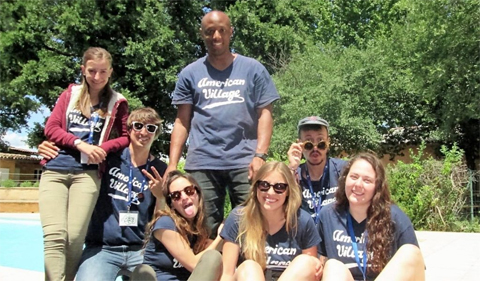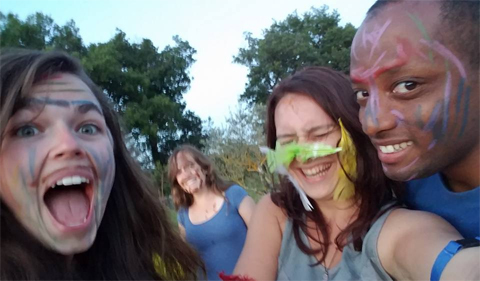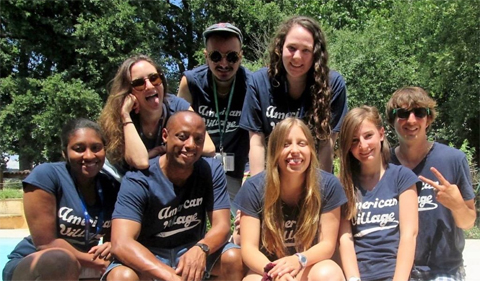
Graduate Student Micah McCrary (middle, standing) at American Village Officiel, France
By Kristin M. Distel
Graduate student Micah McCrary is spending his summer teaching at American Village Officiel, a summer camp for elementary-age students in the south of France.
“While I’ve always been interested in going back and forth between teaching college students/adults and teaching children, my work abroad has been different in that there’s both a language- and culture-based exchange going on, which makes for interesting (and fun) work in the classroom,” McCrary explains.
McCrary is a third-year doctoral student in Ohio University’s English Department. His current area of specialization is rhetoric and composition, though he also holds a Master of Fine Arts degree from Columbia College Chicago.
Publication of Essay, ‘Summer of Léon’
McCrary recently published an essay, “Summer of Léon,” about the teaching experience he gained during his time in France. The essay appears in Entropy, which describes itself as “a website that seeks to engage with the literary community, that becomes its own community, and creates a space for literary and non-literary ideas.”
In the essay, McCrary describes the personal and professional advantages of teaching abroad. This is the second summer that McCrary has worked at American Village, having also worked at the camp in summer of 2015. He finds that working as an ESL counselor and teacher brings laughter and adventure, but it also comes with its fair share of challenges for teachers and students alike.
“I assumed upon my arrival in rural, southern France to teach ESL to children at an English immersion camp, that there’d be some sense of magic surrounding French students,” McCrary writes. “I thought that because they weren’t American students they might refresh the novelty and enchantment I found in the classroom when I first began teaching—I wasn’t dismayed teaching American students by any means, but I needed, after years of doing many of the same things in my classes, to revitalize my relationship with students and my approaches to teaching.
“I thought going to France might be a way to find what I was looking for, but instead of just enchanting students, I found an enchanting experience—living across the ocean as someone other than my everyday self.”

Micah McCrary (right) and fellow ESL counselors at American Village Officiel
Language Immersion and Cultural Exchange
The purpose of the camp, McCrary explains, is to provide language immersion—in English—for French-speaking students. Between 30 and 60 students come to the camp each summer, where they spend two hours in English language classes. They spend the rest of their time playing games, competing in sporting events, and engaging in other activities, such as plays and skits.
In order to foster their development in a new language, McCrary notes, everything is conducted in English. Responsibilities for camp counselors range from creating lesson plans and teaching to more typical camp counselor duties—telling campfire stories and taking kids on hikes and nature walks.
“For many campers, our counselors are the first foreigners they have ever met. This positive culture exchange not only helps them to form words, phrases, and sentences in English, but also helps them to form positive ideas about our world community,” the American Village website explains.
For McCrary, the experience of being an ESL teacher and counselor in France goes beyond cultural exchange or even enhancing his pedagogical skills, though these were both essential parts of his experience.
“Something that has connected us all here, I’ve come to see, is that in some ways we’re all the same kind of person. We’re all the type to hop on a plane or a train and go to another country for a job like this—and because of this there’s an inherent language we share: A language that helps form the identities we forge when we take on our roles as counselors,” McCrary writes.

Micah McCrary (second from left) and fellow ESL counselors at American Village Officiel, France
Bringing ESL Teaching Skills to the OHIO Classroom
McCrary, who has been teaching college writing courses for six years—including two years of teaching at OHIO—finds that teaching in France informs and improves his teaching in the United States.
“I’ve long been interested in ESL, and teaching it more formally asks me to sort of cross-pollinate my teaching habits by thinking about things I’ve done with fifth-graders, for example, that might also work in a college classroom, and vice versa. It makes the job of teaching a lot of fun to know that I can contrast both experiences constantly, and I hope to continue doing so as I work with an increasingly more diverse population here at OHIO.”


















Comments